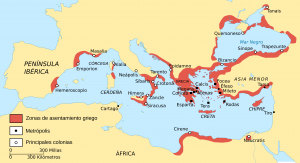Araucans
Greek Colonisation *
Greek Colonisation is something of misnomer on two counts. First of all is the fact that there was no unified Greek state until the time of Alexander the Great. Instead the territory was fragmented into a number of competing city- states (poleis) that formed shifting alliances to meet the exigencies of the day.
Secondly, the term ‘colonisation’ did not mean the same then as it does today. Individual city states had their own expansion ambitions, which were generally concerned with trade rather than  territory. It seems that most of the colonies began as trading posts, known as emporia(a), some developing into towns, others grew into urban centres and even established colonies of their own.
territory. It seems that most of the colonies began as trading posts, known as emporia(a), some developing into towns, others grew into urban centres and even established colonies of their own.
In the first millennium BC, some of the Greek city-states gradually expanded their influence(c) eastward into Asia Minor and the Black Sea and westward along the northern coast of the Mediterranean, eventually founding Massalia (modern Marseilles), which established emporia in eastern Spain.
Some writers, such as Henriette Mertz, have proposed that the ancient Greeks travelled as far as America and that Homer’s story of Odysseus was a retelling of such a voyage(k). More recently, Minas Tsikritsis has claimed that the Greeks had contact with North America, at least as far back as 86 AD!(d) Some time later he expanded on the idea in a paper published on the Researchgate website(e). Manolis Koutlis went further in his book, In the Shadow: The Greek Colonies of North America and the Atlantic 1500 BC -1500 AD [1617].
Even more extreme is the odd claim by Lonko Kilapan that ancient Greeks colonists settled in Chile and whose descendants are known now as Mapuche and earlier as Araucans or Araucanians(f) . Michael Issigonis has championed the idea of early Greeks in South America and elsewhere on the Academia.edu website(g)(h).
Tara MacIsaac published an article(i) supporting this idea of ancient Greeks in South America, apparently influenced by Enrico Mattievich and earlier comments by José Imbelloni.
The greek-thesaurus.gr website offers three pages of images of artefacts found in the Americas that can be interpreted as evidence of ancient Greek influence in the region(j). The compiler claims that “If these pictures are not proofs for the existence of the ancient Greeks in America the word “proof” has lost it’s meaning.”
The Phoenicians had their own city-states such a Tyre, Sidon and Byblos. They established ‘colonies along north Africa, and Spain. They competed with the Greeks, particularly in the central Mediterranean, where at one point they shared Sicily. Settlers from Tyre founded Carthage, which in turn became more powerful than and independent of its parent city and became more belligerent, eventually engaging in a series of wars with Rome, which it lost.
There is much more relevant information to be found on the excellent Ancient History Encyclopedia website(b) .
(a) https://www.academia.edu/1505105/The_origins_of_Greek_colonisation_and_Greek_polis_some_observations
(b) https://www.ancient.eu/edu/
(c) https://www.ancient.eu/Greek_Colonization/
(e) https://www.researchgate.net/publication/321319687/download
(f) THE UNKNOWN HELLENIC COLONIZATION.THE CASE OF THE ARAUCANS OF CHILE (archive.org) *
(g) https://www.academia.edu/9066795/Did_the_Mapuche_of_Chile_travel_from_Homeric_Age_Greece
(h) https://www.academia.edu/32921347/ANCIENT_GREEKS_TRAVELLED_WORLDWIDE
(j) https://www.greek-thesaurus.gr/Ancient-Greeks-existence-America.html
